100 mg/dL of protein in your urine means you have more protein than normal. Usually, your kidneys keep protein in your body. This amount could be a sign of kidney stress or infection. It’s often temporary, but seeing your doctor will help figure out why it’s happening and what to do next. They may suggest some tests or changes to your diet.
Finding out you have protein in your urine can be a little scary. It’s a common concern, and many people wonder what it means for their health. Seeing “100 mg/dL” on a lab report might sound confusing, but don’t worry! We’re here to break it down for you simply.
Think of your kidneys as tiny filters. They’re supposed to keep the good stuff in your blood and get rid of the waste. When protein shows up in your urine, it means something might be affecting those filters. We’ll walk through what that “something” could be, what steps to take, and how to keep your kidneys happy. Ready to learn more? Let’s get started!
Understanding Proteinuria: Protein in Urine
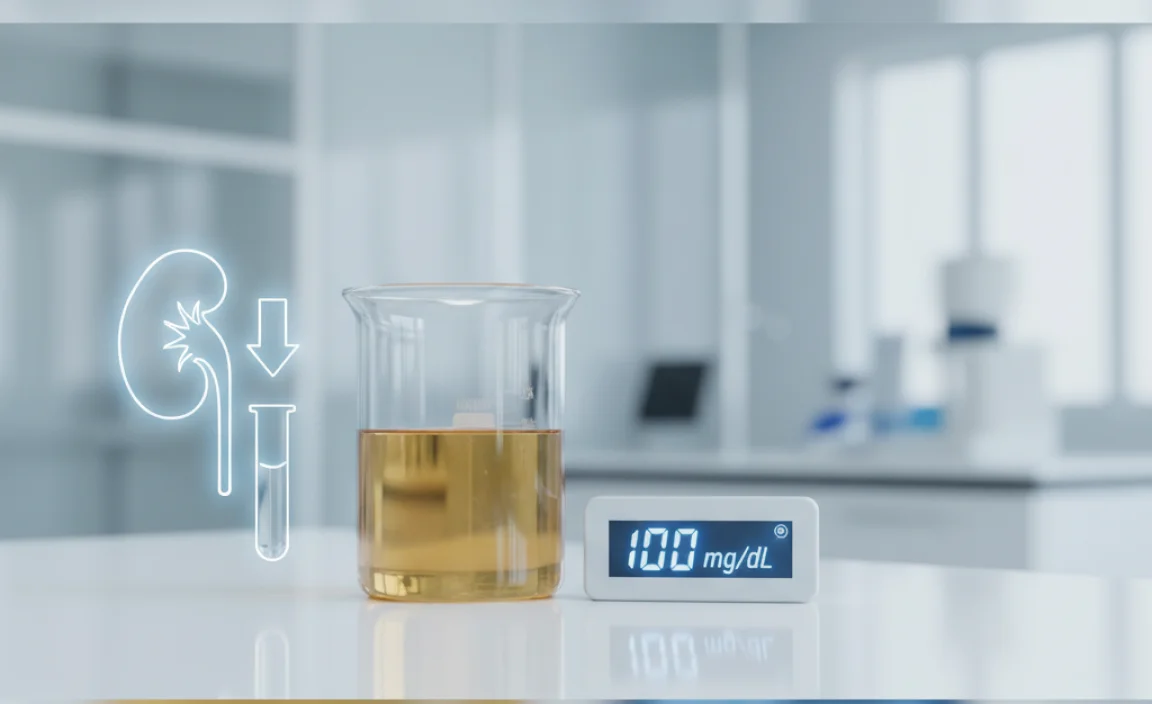
Let’s get clear on the basics. Proteinuria is the medical term for having protein in your urine. It isn’t always a big deal, but it’s important to understand what’s going on.
What’s Considered Normal?
Normally, your kidneys do a great job of keeping protein out of your urine. A healthy person should have very little protein showing up in a urine test. Usually, you’ll see something like 0 to 14 mg/dL. When the amount goes higher, like 100 mg/dL, that’s when doctors start paying closer attention.
Why is Protein Important?
Protein is super important for your body. It helps build and repair tissues, fight infections, and keep fluids balanced. You need protein in your blood, not leaking out into your urine.
How is Proteinuria Detected?
Proteinuria is usually found during a routine urine test. This test checks for different things in your urine, including protein, sugar, and blood cells. If your doctor finds protein, they might order more tests to figure out why.
What Does 100 mg/dL Mean?
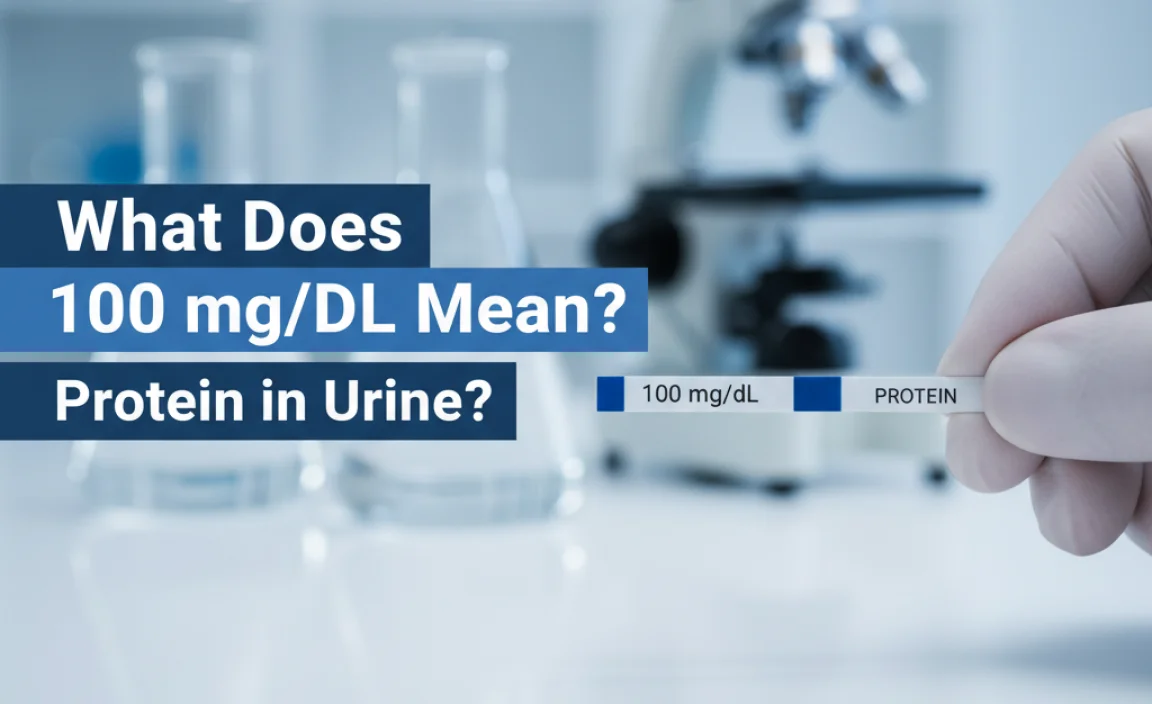
So, what does 100 mg/dL actually mean? It means you have a higher-than-normal amount of protein in your urine. It’s not extremely high, but it’s enough to warrant further investigation. It suggests that your kidneys might not be filtering blood as effectively as they should.
Levels of Proteinuria
Proteinuria is often classified into different levels, helping doctors understand the severity and potential causes:
- Minimal Proteinuria: Usually less than 30 mg/dL. This might not be a cause for concern and could be due to temporary factors.
- Mild Proteinuria: Ranges from 30 to 300 mg/dL. 100 mg/dL falls into this category, signaling a need for further evaluation.
- Moderate Proteinuria: Levels between 300 to 1000 mg/dL indicate a more significant issue.
- Severe Proteinuria: Over 1000 mg/dL suggests serious kidney damage.
Interpreting the Results
A result of 100 mg/dL is generally considered mild proteinuria. It’s not an emergency, but it’s a signal that something might be going on with your kidneys or overall health. This level usually prompts your doctor to investigate further to determine the underlying cause.
Possible Causes of 100 mg/dL Protein in Urine
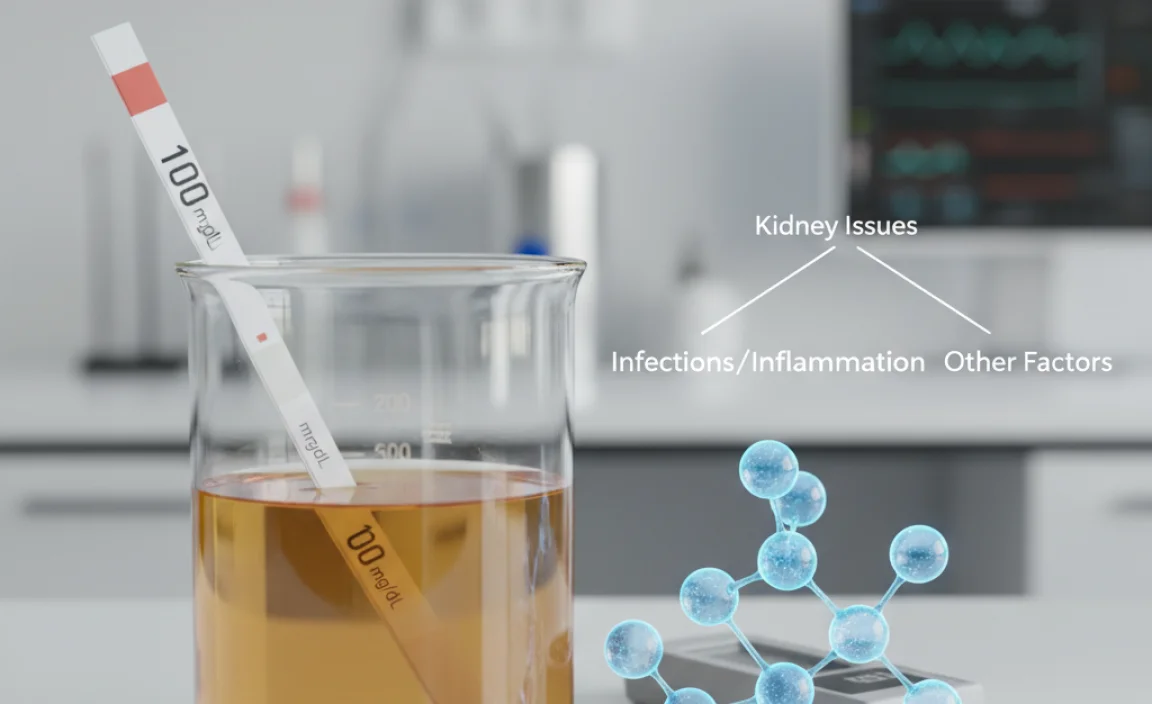
There are many reasons why you might have 100 mg/dL of protein in your urine. Some are temporary and harmless, while others need medical attention. Let’s explore some common causes.
Temporary Causes
Sometimes, protein in your urine is just a temporary thing. Here are a few reasons why:
- Exercise: Strenuous physical activity can sometimes cause protein to leak into your urine.
- Dehydration: Not drinking enough water can stress your kidneys.
- Fever: Being sick and having a high temperature can affect kidney function.
- Stress: Emotional or physical stress can sometimes lead to temporary proteinuria.
- Pregnancy: Pregnant women often have slightly higher protein levels in their urine.
Medical Conditions
Other times, protein in your urine can be a sign of an underlying medical condition. Here are some possibilities:
- Kidney Infection: Infections can damage the kidneys and cause protein to leak into the urine.
- Glomerulonephritis: This is a type of kidney disease that affects the filtering units (glomeruli).
- Diabetes: High blood sugar levels can damage the kidneys over time.
- High Blood Pressure: Uncontrolled high blood pressure can also harm the kidneys.
- Preeclampsia: This is a condition that can occur during pregnancy, characterized by high blood pressure and protein in the urine.
- Multiple Myeloma: A type of cancer that affects plasma cells and can lead to kidney problems.
Medications
Certain medications can also cause protein in your urine as a side effect. These might include:
- NSAIDs: Nonsteroidal anti-inflammatory drugs like ibuprofen and naproxen.
- Antibiotics: Some antibiotics can affect kidney function.
- Certain Blood Pressure Medications: ACE inhibitors and ARBs can sometimes cause proteinuria, although they are also used to treat kidney disease.
Diagnosis and Further Testing
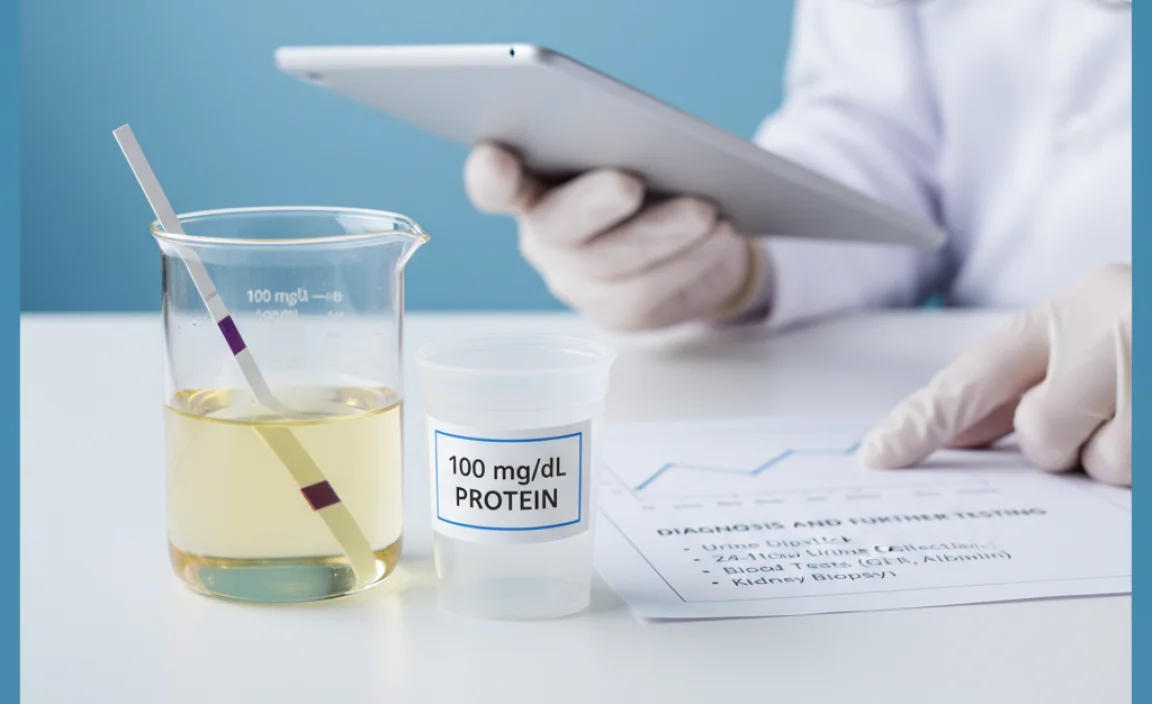
If your urine test shows 100 mg/dL of protein, your doctor will likely want to do more tests to figure out the cause. Here’s what you can expect.
Medical History and Physical Exam
Your doctor will start by asking about your medical history, including any existing conditions, medications you’re taking, and any recent illnesses or stressors. They will also perform a physical exam to check your overall health.
Repeat Urine Tests
Your doctor will likely order repeat urine tests to see if the protein is consistently high or if it was just a one-time occurrence. These tests might include:
- Dipstick Test: A quick test done in the office to check for protein.
- 24-Hour Urine Collection: This involves collecting all your urine over a 24-hour period to measure the total amount of protein.
- Urine Protein-to-Creatinine Ratio: This test compares the amount of protein to creatinine (a waste product) in your urine.
Blood Tests
Blood tests can help assess your kidney function and look for signs of other conditions. Common blood tests include:
- Creatinine: Measures how well your kidneys are filtering waste.
- Blood Urea Nitrogen (BUN): Another measure of kidney function.
- Albumin: Checks the level of protein in your blood.
- Glucose: Checks for diabetes.
- Electrolytes: Assesses the balance of important minerals in your blood.
Kidney Biopsy
In some cases, your doctor might recommend a kidney biopsy. This involves taking a small sample of kidney tissue to examine under a microscope. This can help diagnose specific kidney diseases.
Treatment Options
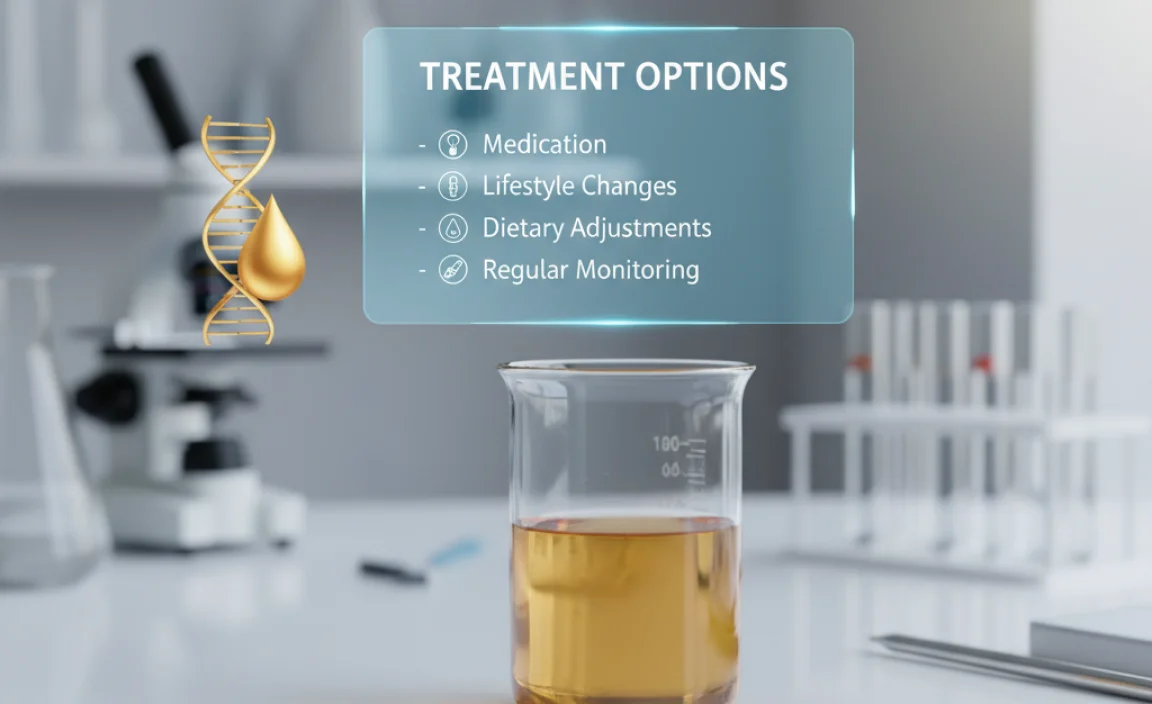
The treatment for proteinuria depends on the underlying cause. Here are some common approaches.
Addressing Underlying Conditions
If your proteinuria is caused by a medical condition like diabetes or high blood pressure, the first step is to manage that condition. This might involve:
- Medications: Taking prescribed medications to control blood sugar or blood pressure.
- Lifestyle Changes: Making changes to your diet, exercise routine, and stress levels.
Medications
Certain medications can help reduce protein in your urine and protect your kidneys. These include:
- ACE Inhibitors and ARBs: These medications are often used to treat high blood pressure and can also reduce protein leakage.
Dietary Changes
Diet can play a significant role in managing proteinuria. Here are some helpful tips:
- Reduce Sodium Intake: High sodium can increase blood pressure and stress your kidneys.
- Limit Protein Intake: While you need protein, too much can strain your kidneys.
- Stay Hydrated: Drinking plenty of water helps your kidneys function properly.
- Avoid Processed Foods: These often contain high levels of sodium and other additives that can harm your kidneys.
Lifestyle Adjustments
Making some lifestyle changes can also help improve your kidney health:
- Regular Exercise: Aim for at least 30 minutes of moderate exercise most days of the week.
- Maintain a Healthy Weight: Obesity can increase your risk of kidney disease.
- Quit Smoking: Smoking damages blood vessels and can harm your kidneys.
- Manage Stress: Find healthy ways to cope with stress, such as yoga, meditation, or spending time in nature.
Preventing Proteinuria
While you can’t always prevent proteinuria, there are steps you can take to keep your kidneys healthy and reduce your risk.
Stay Hydrated
Drinking enough water is crucial for kidney health. Aim for at least eight glasses of water a day, or more if you’re active or live in a hot climate.
Maintain a Healthy Diet
A balanced diet that’s low in sodium, processed foods, and excessive protein can help protect your kidneys. Focus on eating plenty of fruits, vegetables, and whole grains.
Control Blood Pressure and Blood Sugar
If you have high blood pressure or diabetes, it’s essential to manage these conditions with medications and lifestyle changes. Keeping your blood pressure and blood sugar under control can prevent kidney damage.
Avoid Overusing NSAIDs
Nonsteroidal anti-inflammatory drugs (NSAIDs) like ibuprofen and naproxen can harm your kidneys if taken regularly or in high doses. Talk to your doctor about alternative pain relief options.
Regular Check-Ups
Regular medical check-ups, including urine tests, can help detect proteinuria early. Early detection and treatment can prevent kidney damage from progressing.
Living with Proteinuria
If you’ve been diagnosed with proteinuria, it’s important to take steps to manage your condition and protect your kidneys. Here are some tips for living with proteinuria.
Follow Your Doctor’s Recommendations
Your doctor will provide specific recommendations based on the cause of your proteinuria and your overall health. Be sure to follow their advice carefully.
Monitor Your Kidney Function
Regular blood and urine tests can help monitor your kidney function and detect any changes early. This can help your doctor adjust your treatment plan as needed.
Manage Other Health Conditions
If you have other health conditions like diabetes or high blood pressure, it’s important to manage them effectively. This can help prevent further kidney damage.
Stay Active
Regular physical activity can help improve your overall health and protect your kidneys. Aim for at least 30 minutes of moderate exercise most days of the week.
Get Enough Sleep
Getting enough sleep is important for your overall health and can help reduce stress on your kidneys. Aim for 7-8 hours of sleep per night.
When to See a Doctor
It’s important to see a doctor if you have protein in your urine, especially if you have other symptoms or risk factors for kidney disease. Here are some signs that you should seek medical attention:
- Foamy Urine: This can be a sign of high levels of protein in your urine.
- Swelling: Swelling in your feet, ankles, or face can indicate kidney problems.
- Fatigue: Feeling tired or weak can be a sign of kidney disease.
- Changes in Urination: Changes in how often you urinate, or the amount of urine you produce, can be a sign of kidney problems.
- High Blood Pressure: Uncontrolled high blood pressure can damage your kidneys.
- Diabetes: If you have diabetes, it’s important to monitor your kidney function regularly.
Additional Resources
For more information about proteinuria and kidney health, here are some helpful resources:
- National Institute of Diabetes and Digestive and Kidney Diseases (NIDDK)
- National Kidney Foundation (NKF)
- Centers for Disease Control and Prevention (CDC) – Kidney Disease
Proteinuria Levels Chart
| Proteinuria Level | Protein Amount (mg/dL) | Significance |
|---|---|---|
| Normal | 0-14 | Healthy kidney function |
| Minimal | 15-30 | Usually not a concern |
| Mild | 30-300 | Requires further evaluation |
| Moderate | 300-1000 | Indicates a more significant issue |
| Severe | >1000 | Suggests serious kidney damage |
Common Medications and Proteinuria
| Medication Type | Examples | Potential Effect on Kidneys |
|---|---|---|
| NSAIDs | Ibuprofen, Naproxen | Can reduce blood flow to the kidneys, potentially causing kidney damage and proteinuria with overuse. |
| Antibiotics | Aminoglycosides (e.g., Gentamicin) | Some antibiotics can be toxic to the kidneys, leading to proteinuria and kidney dysfunction. |
| ACE Inhibitors & ARBs | Lisinopril, Losartan | Can initially cause proteinuria as they change kidney blood flow, but are also used to protect kidneys long-term. |
| Chemotherapy Drugs | Cisplatin | Certain chemotherapy drugs can cause significant kidney damage, leading to high levels of proteinuria. |
Conclusion
Discovering protein in your urine can be concerning, but understanding what 100 mg/dL means is the first step toward addressing the issue. Remember, it indicates a need for further evaluation to determine the underlying cause, whether it’s a temporary issue or a sign of a medical condition.
By working closely with your doctor, making necessary lifestyle adjustments, and following a tailored treatment plan, you can effectively manage proteinuria and protect your kidney health. Stay proactive, stay informed, and take those simple steps to ensure your kidneys are in tip-top shape! You’ve got this!
FAQ About Protein in Urine
What does it mean if I have protein in my urine?
It means your kidneys aren’t filtering protein as well as they should. It could be temporary or a sign of an underlying condition.
Is 100 mg/dL of protein in urine dangerous?
It’s considered mild proteinuria and isn’t an emergency, but it needs further investigation to find the cause.
Can exercise cause protein in urine?
Yes, strenuous exercise can sometimes cause a temporary increase in protein levels.
What should I do if I have protein in my urine?
See your doctor for further testing and evaluation. They’ll help determine the cause and recommend the right treatment.
Can diet affect protein in urine?
Yes, a diet high in sodium and protein can strain your kidneys. A balanced diet is important.
Is protein in urine a sign of kidney disease?
It can be, but it’s not always the case. Other conditions like infections, high blood pressure, or diabetes can also cause it.
How is protein in urine treated?
Treatment depends on the cause. It might involve medications, dietary changes, or managing underlying conditions.
